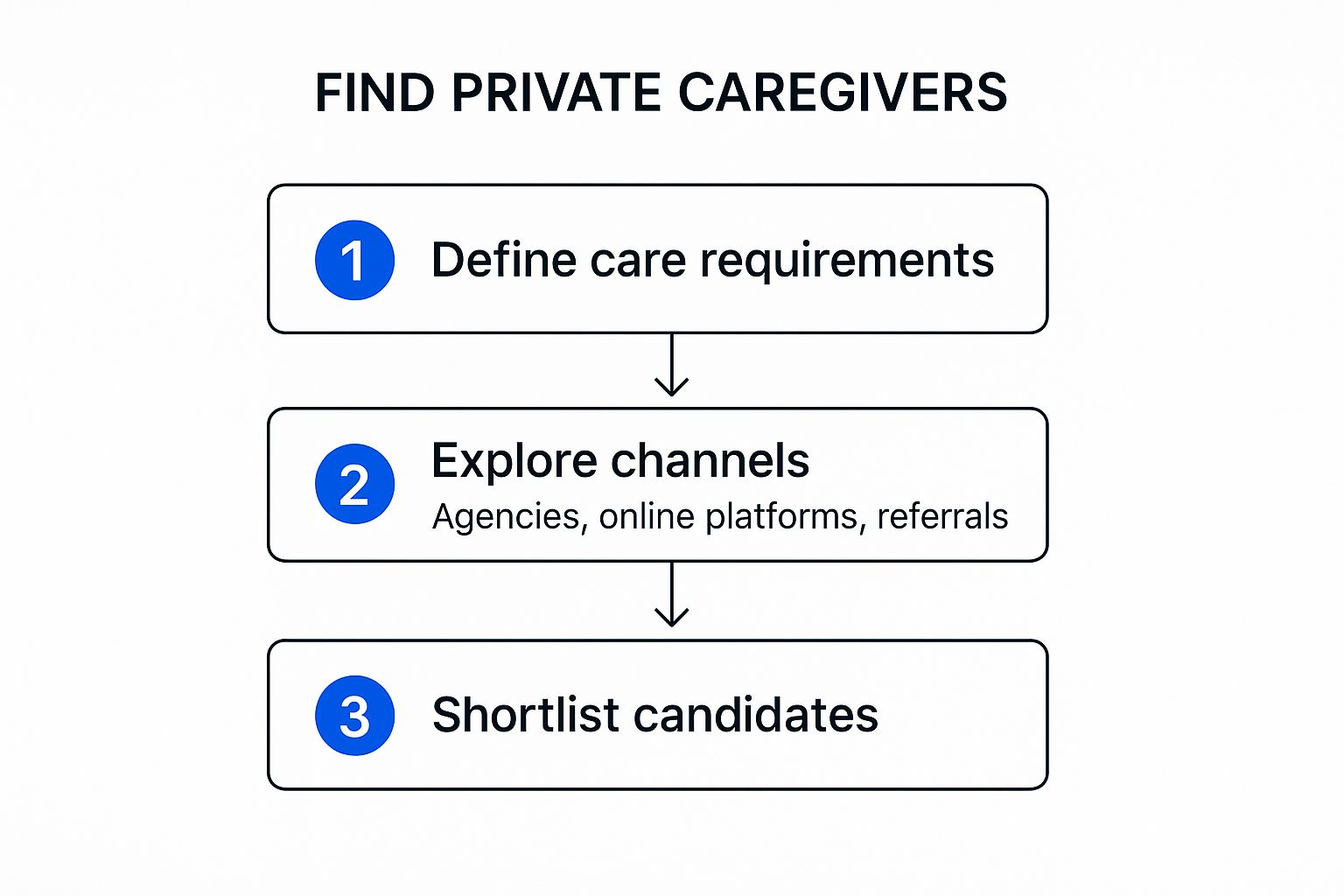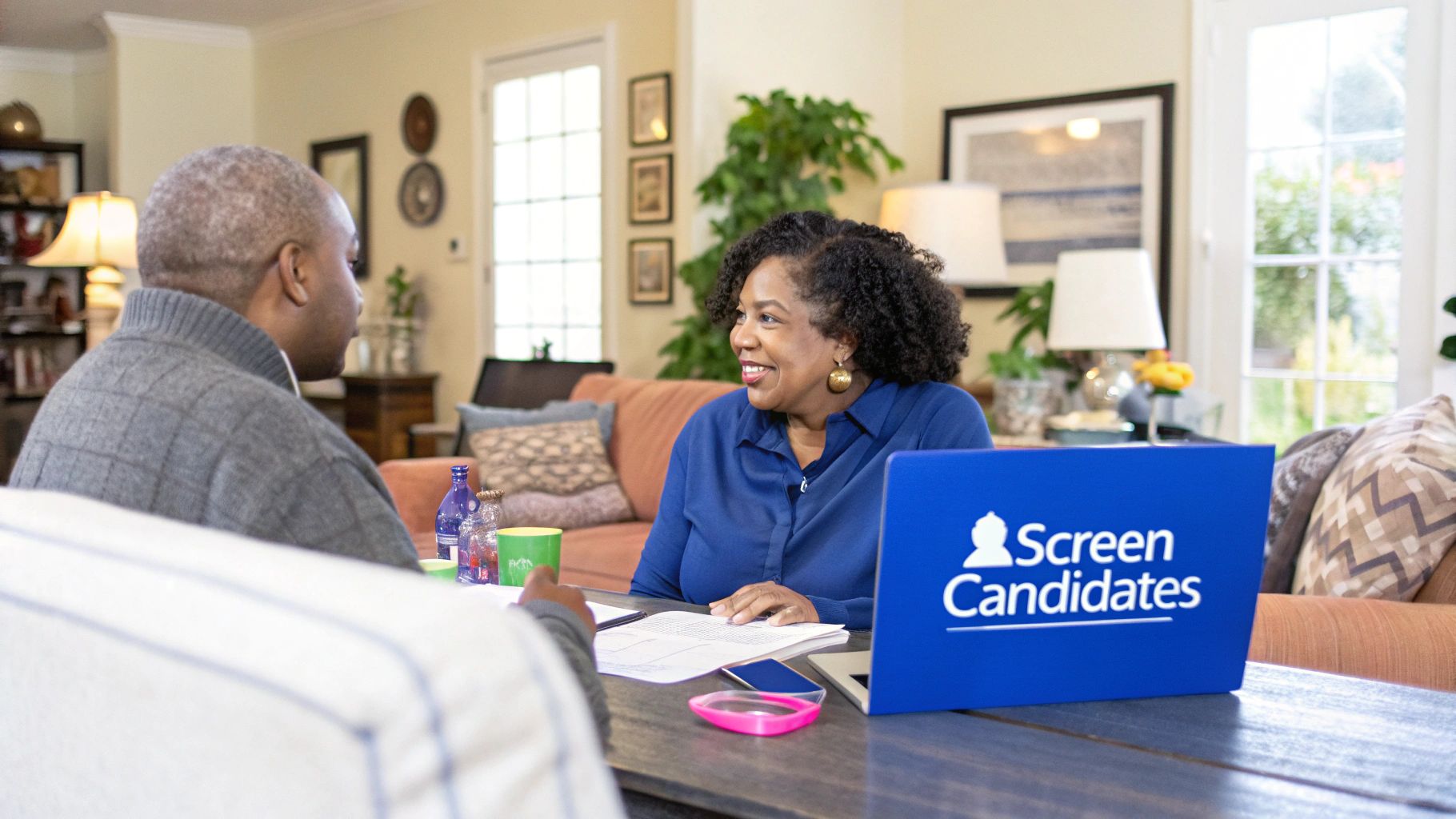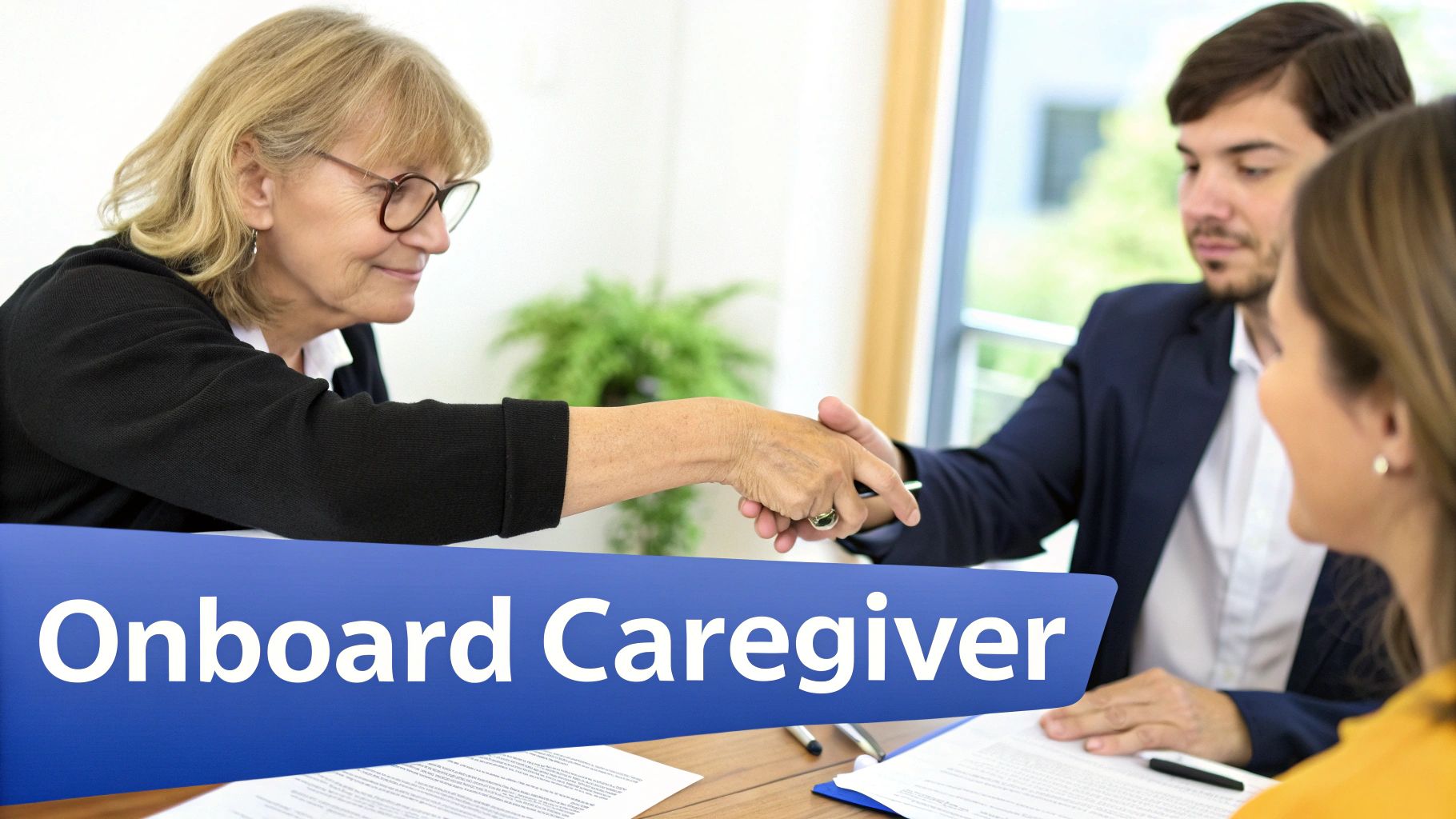Finding the right private caregiver isn’t about just filling a spot; it’s about finding a true partner in your family’s care journey. And that whole process starts with a really honest look at what your family actually needs, moving way beyond a generic checklist to really map out your loved one's day-to-day life and even their personality.
Getting this first part right is the single most important thing you can do.
Defining Your Family's Real Care Needs

Before you even think about posting a job or calling an agency, you need to create a detailed blueprint of the support you’re looking for. Think of it as building a realistic profile of what care looks like in your home.
A fantastic way to start is by simply writing down what a typical day looks like for your loved one. I mean everything—from the moment they wake up to their bedtime routine.
This simple exercise forces you to get specific. It’s easy to say, "Mom needs help," but what does that really mean on a Tuesday afternoon? Does she need hands-on help getting dressed and bathed, or is the bigger need for a friendly face to chat with and someone to cook nutritious meals?
Distinguishing Between Types of Care
Once you have a daily picture, you can start to categorize the needs. Understanding the different levels of support is key because each one calls for a different set of skills from a caregiver.
- Companionship and Homemaking: This is often the starting point. It covers things like conversation, light housekeeping, preparing meals, and maybe running to the grocery store.
- Personal Care (ADLs): These are the essentials of self-care. Think bathing, dressing, grooming, and help moving around safely.
- Instrumental Activities (IADLs): These are the more complex tasks someone needs to handle to live independently. You can learn more about what are instrumental activities of daily living to see if this fits, but it includes things like medication reminders, managing appointments, and transportation.
- Specialized Medical Care: This is a higher level of care, maybe involving wound care, injections, or operating medical equipment. It often requires a caregiver with a specific certification, like a CNA (Certified Nursing Assistant).
When you clearly define these needs, you’re basically writing a job description that will attract the right people. For example, if your father has dementia, you'll want to find someone with genuine experience in memory care, not just a general companion.
The reality is, the demand for this kind of personalized support is skyrocketing. The U.S. home care market hit about $250 billion in 2023 and is expected to climb to $383 billion by 2028. This isn’t surprising when you consider that 88% of older adults are managing at least one chronic condition that requires some level of ongoing support.
This just shows why being specific from the very beginning is so critical. It saves you an incredible amount of time and makes it so much more likely you’ll find someone who can truly improve your loved one's quality of life.
Where to Find Qualified and Trustworthy Caregivers
Once you have a crystal-clear picture of what your family needs, it’s time to start the search. But where do you even begin to look for the right person? Sourcing great candidates is about more than just a quick online search; it’s about tapping into the right channels to find someone you can truly trust with your loved one's well-being.
Getting this part right from the start makes everything else fall into place, as you can see below.

When you know exactly what you’re looking for, sifting through potential candidates becomes much, much easier.
Tapping into Your Personal and Community Network
Let's be honest—the best referrals often come from people you already know. There's a built-in layer of trust when a friend or a trusted professional recommends someone. It’s an invaluable head start.
Don't overlook these powerful sources right in your own backyard:
- Friends, Family, and Neighbors: Start here. Ask if they’ve ever hired a caregiver they loved or know someone who has. A direct recommendation from a friend is gold.
- Healthcare Professionals: Your loved one’s doctor, physical therapist, or even the local pharmacist can be incredible resources. They often know reputable caregivers in the community.
- Community and Support Groups: Think local. Senior centers, places of worship, or support groups for conditions like Alzheimer's or Parkinson's are often hubs of reliable, firsthand information.
The strongest candidates often come through word-of-mouth. A caregiver recommended by a trusted friend or doctor has already passed an informal character and reliability screening, which can give you immense peace of mind.
Exploring Online Caregiver Platforms
Digital marketplaces have completely changed the game, connecting families with care professionals more easily than ever before. It’s no surprise the global healthcare caregiving market was valued at around USD 320 billion in 2023 and is only expected to grow. The rise of these platforms has formalized the hiring process for millions. You can dig deeper into this growing market and its trends on Dataintelo.com.
Websites like these let you browse detailed profiles, read reviews from other families, and often include integrated background check services. They offer a huge pool of candidates, but remember: the responsibility for thorough vetting still falls squarely on your shoulders.
Think of these platforms as a fantastic starting point. Once you identify potential caregivers, you absolutely must follow through with your own comprehensive interviews and reference checks.
Another great, and often overlooked, avenue is to contact local nursing schools or vocational colleges. Students training to be CNAs or nurses are frequently looking for practical experience. They can bring fresh knowledge and a ton of enthusiasm to the role, giving you a chance to find motivated individuals right at the start of their careers.
Choosing where to look for a caregiver depends on your comfort level, urgency, and how much hands-on screening you want to do.
To help you decide, here’s a quick breakdown of the most common sourcing methods.
Comparing Caregiver Sourcing Methods
| Sourcing Method | Pros | Cons | Best For |
|---|---|---|---|
| Personal Referrals | Highly trusted, pre-vetted by someone you know, often a good cultural fit. | Limited pool of candidates, may not be immediately available. | Families who prioritize trust and have a strong local network. |
| Online Platforms | Large selection of candidates, profiles with reviews, built-in tools like background checks. | Requires significant vetting by the family, quality can be inconsistent. | Families who want lots of options and are comfortable managing the hiring process online. |
| Community Groups | Recommendations are often based on positive community experiences and shared values. | Can be slow, availability depends on who is active in the group. | Families looking for a caregiver who is integrated into the local community. |
| Nursing/CNA Schools | Candidates have formal training and are eager to gain experience. | May lack extensive hands-on experience, might have limited availability due to school. | Families who need a caregiver with up-to-date skills and are willing to mentor someone new. |
Ultimately, there's no single "best" way to find someone. Many families have the most success using a combination of these methods to cast a wide yet targeted net.
Mastering The Caregiver Interview

The interview is your chance to get past the résumé and see if there's a genuine personality fit. I always tell families to think of it less like a formal interrogation and more like a structured conversation. Your goal is to uncover a candidate’s empathy, problem-solving skills, and how they handle themselves under pressure.
You've already confirmed they have the basic qualifications on paper. Now, you need to find out how they approach the very human side of care. This is where you discover the difference between someone who just performs tasks and someone who can build a trusting, compassionate relationship.
Asking Questions That Reveal True Character
Standard interview questions like, "What are your strengths?" have a place, but they rarely tell you how someone will react in a real-life care situation. The secret is using situational and behavioral questions that force them to think on their feet.
So, instead of just asking if they have experience with dementia, frame it as a scenario:
- "My father sometimes gets agitated in the late afternoon and insists he needs to go to work, even though he's retired. How would you handle that?"
A question like this reveals so much more about their patience, creativity, and real understanding of the condition than a simple "yes" could ever do. You get to see their thought process for de-escalating a situation while preserving dignity.
Key Takeaway: The goal isn't to find someone with a "perfect" script. It's to find a person whose approach and values align with your family's. Listen for responses that show compassion, respect, and a calm demeanor.
What to Look For Beyond Their Words
A candidate's non-verbal cues can be just as telling as their answers. Pay close attention to their body language and overall vibe during the conversation.
- Active Listening: Are they making eye contact and truly listening, or do they seem distracted, just waiting for their turn to talk?
- Empathy and Tone: Does their voice convey warmth and understanding, especially when you're discussing challenging care scenarios?
- Professionalism: Did they show up on time? Are they presenting themselves professionally? These small details often speak volumes about their reliability and respect for the role.
Observing these subtle cues helps you build a more complete picture of the person. For an even deeper dive into what to look for, exploring a comprehensive guide on hiring a caregiver can give you some extra valuable insights.
Involving Your Loved One in the Process
If your loved one is able and willing, including them in the final stages of the interview is an excellent move. You don't need to put them through a formal Q&A, but even a brief, casual introduction can be incredibly revealing.
Try arranging for your top two or three candidates to meet your loved one for a short, informal chat. Observe their interaction from a slight distance. Does the caregiver speak directly to your loved one with respect, or do they direct all their comments to you?
This simple step lets you see the chemistry—or lack thereof—firsthand. A caregiver can have perfect credentials, but if they don't connect with the person they'll be caring for, it's just not the right fit. This interaction is often the final piece of the puzzle in finding someone who will be a truly positive and calming presence in your home.
Trust is everything when it comes to in-home care. You're building that trust, piece by piece, through a solid vetting process. Once you’ve had a great interview with a candidate, the real homework begins. It's time to verify everything they've told you and dig just a little deeper.
This isn’t about being distrustful. It’s about being responsible for the safety and well-being of the person you care about most. This phase really breaks down into two crucial parts: the official background checks and the more personal reference conversations. One gives you the hard data, the other gives you the human story.
Running Essential Background Checks
Let’s be clear: a formal background check is non-negotiable. Many online platforms will handle this for you, but if you're hiring on your own, you'll need to use a reputable third-party service to run one. This is the single most important step to ensure you know exactly who you are welcoming into your home.
So, what should you be looking for? At a minimum, you’ll need:
- A National Criminal Record Check: This should scan both county and federal records for any red flags.
- A Driving Record Check: This is an absolute must if the caregiver will be driving your loved one, whether to doctor's appointments or just to run errands.
- Verification of Certifications: Don't just take their word for it. You need to independently confirm any licenses or certifications they list, like a CNA (Certified Nursing Assistant) license or current CPR/First Aid training.
Thankfully, this is all becoming more standard as the caregiving industry professionalizes. North America currently holds a dominant 36.4% share of the entire caregiving market, with places like Canada leading the way on formalized training programs. You can even see a global push for verified qualifications with initiatives like the 'iSupport' program for dementia caregivers, developed with the World Health Organization.
If you're interested in the data behind these market shifts and why formal training is becoming so critical, you can learn more about the health caregiving market on coherentmarketinsights.com.
How to Get Real Insights from References
Calling references is your chance to see beyond the résumé and get a genuine feel for a caregiver's character and work ethic. This is where the little details that truly matter often come to light. Don't just tick a box by asking, "Would you hire them again?" You have to go deeper with questions that paint a real-world picture.
The most valuable information from a reference check comes from asking about specific behaviors and situations. You're looking for patterns of reliability, compassion, and professionalism.
Try to ask questions that invite a story, not just a simple yes or no. For example, you could ask:
- "Could you tell me about a time they had to handle an unexpected change in your mom's schedule? How did they react?"
- "What was their communication like? How did they keep you in the loop about changes in your father's condition or even just his mood?"
- "Can you describe a challenging situation they faced on the job and how they worked through it?"
- "What was their relationship like with your loved one? How did they build that connection?"
Pay close attention to how they answer. Sometimes, a hesitation or a vague response can tell you just as much as a glowing review. This final layer of vetting is what will give you the confidence that you're making a fully informed decision, based on a complete picture of the person you're hiring.
Handling the Legal and Financial Side of Hiring

You’ve found the right person—that’s a huge relief. But the work isn't quite done. Now it's time to shift from searching and interviewing to formalizing your professional relationship.
Taking a little time to properly handle the legal and financial side protects everyone involved: your family, your loved one, and the caregiver you’ve worked so hard to find. Think of it as building a strong foundation for a lasting partnership. A clear, professional start prevents so many misunderstandings down the road.
Crafting a Clear Caregiver Contract
A detailed caregiver contract, sometimes called a personal care agreement, is probably the most important tool you'll create. This document isn't just a formality; it’s a roadmap that outlines every single aspect of the job, making sure everyone is on the same page from day one.
Leaving expectations unspoken is a recipe for conflict. When you have a written agreement, you have a reference point for everything from daily duties to how to handle unexpected situations.
Your contract should clearly define:
- Scope of Duties: Be specific. List all the tasks you expect, from personal care and medication reminders to meal prep, light housekeeping, and transportation.
- Work Schedule: Detail the exact days and hours of work. Don't forget to include protocols for breaks and what happens on holidays.
- Compensation: State the hourly pay rate, your overtime policy (as required by law), and the pay schedule (e.g., weekly, bi-weekly).
- Policies and Procedures: This is where you'll cover rules about confidentiality, use of a personal vehicle, sick days, and vacation time.
This document becomes your guide. If questions or disagreements pop up later, you can both refer back to the agreement you created together.
The caregiver contract isn't about mistrust; it's about clarity. A well-written agreement is the cornerstone of a professional relationship, ensuring that both parties feel secure and respected in their roles.
Understanding Your Role as a Household Employer
Here’s a crucial detail that many families overlook: when you hire a private caregiver directly, you become what the IRS calls a "household employer." This comes with specific legal and tax responsibilities that you absolutely must follow.
The most important thing to understand is the caregiver's employment status. In almost every single case, a caregiver you hire and direct is considered your employee, not an independent contractor. This means you are responsible for withholding and paying their taxes.
You'll need to handle a few key financial tasks:
- Obtain an Employer Identification Number (EIN): You'll need this number from the IRS for all your tax filings.
- Withhold Taxes: This includes Social Security, Medicare (often called FICA taxes), and federal and state unemployment taxes (FUTA/SUTA).
- Issue Pay Stubs and a W-2: At the end of the year, you must provide your caregiver with a W-2 form, not a 1099.
Managing payroll can feel overwhelming, but there are specialized payroll services designed just for household employers that can handle all the calculations and filings for you. This kind of professional support can be invaluable, especially for families looking for reliable home care assistance without getting bogged down by administrative headaches.
Getting this framework set up properly from the start ensures you’re legally compliant and helps build a professional, trusting care partnership for the long haul.
Got Questions About Hiring a Private Caregiver?
Jumping into the world of private caregiving can feel like navigating a maze. It’s totally normal to have a lot of questions. Getting clear, straightforward answers is the best way to move forward with confidence and make sure you’re doing what’s best for your family.
Let's walk through some of the most common things families ask when they start looking for in-home care.
What’s the Going Rate for a Private Caregiver?
This is a big one, and the honest answer is: it depends. The cost of a private caregiver changes quite a bit based on where you live, their level of experience, and the specific kind of care you need. As a general rule of thumb, you can expect to see hourly rates anywhere from $20 to $35 per hour.
Keep in mind, rates in big cities will almost always be on the higher end of that scale. Also, if you’re looking for someone with specialized skills—like experience with dementia, post-op recovery, or specific nursing certifications—you’ll need to budget for a higher rate. It's only fair to pay for that expertise.
When you're crunching the numbers, don't forget you’ll be a household employer, which means you're also on the hook for payroll taxes. You might also need to get workers' compensation insurance, so be sure to factor that into your total budget.
Should I Go Through an Agency or Hire Someone on My Own?
This is probably one of the biggest crossroads you'll face. There are real pros and cons to both, and the right path really comes down to your budget, how much time you can dedicate to the search, and how comfortable you are taking on the role of an employer.
-
Hiring Privately: This route puts you completely in the driver's seat. You get to manage the whole show, from sifting through resumes to making the final call. It’s also almost always the cheaper option since you’re not paying agency overhead. The flip side? You’re responsible for everything—running background checks, handling payroll and taxes, and figuring out backup care when your caregiver inevitably gets sick.
-
Using an Agency: An agency does all the heavy administrative lifting. They find, vet, and run checks on caregivers, manage all the legal and payroll stuff, and can usually send a substitute caregiver in a pinch. Of course, that convenience costs more, and their hourly rates are significantly higher to cover those services.
At the end of the day, hiring privately gives you more control and costs less, but you have to wear the employer hat. An agency offers a safety net and convenience, but you'll pay a premium for it.
How Can I Create a Great Work Environment for Our Caregiver?
Building a solid relationship with a caregiver starts with two things: mutual respect and clear communication. When your caregiver feels valued, it doesn't just help keep them around longer—it directly impacts the quality of care your loved one gets.
Start off on the right foot with a clear, detailed caregiver contract. This sets professional expectations right from day one. From there, it's all about keeping the lines of communication open and treating them like the crucial part of the care team they are.
Honestly, the little things make a massive difference. Make sure your home is a safe and welcoming place to work, always pay them on time and what they're worth, and don't forget to say "thank you." A caregiver who feels supported and respected is going to be the one who provides the compassionate, top-notch care your family is looking for.
At NJ Caregiving, we understand that finding the right care solution can be a complex journey. Our team is here to provide compassionate, professional in-home care tailored to your family's unique needs. To learn how we can support you, visit us at https://njcaregiving.com.



